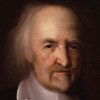“ everything that makes men feel a passionate interest in each other seems to be forgotten. ”
Bertrand Russell, A History of Western Philosophy (1945). copy citation
| Author | Bertrand Russell |
|---|---|
| Source | A History of Western Philosophy |
| Topic | interest forgetting |
| Date | 1945 |
| Language | English |
| Reference | |
| Note | |
| Weblink | http://www.ntslibrary.com/PDF%20Books/History%20of%20Western%20Philosoph... |
Context
“More generally, there is an emotional poverty in the Ethics, which is not found in the earlier philosophers. There is something unduly smug and comfortable about Aristotle’s speculations on human affairs; everything that makes men feel a passionate interest in each other seems to be forgotten. Even his account of friendship is tepid. He shows no sign of having had any of those experiences which make it difficult to preserve sanity; all the more profound aspects of the moral life are apparently unknown to him.”
source


